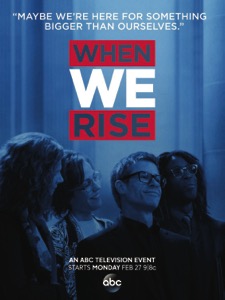
When We Rise, the recent mini-series covering the LGBT civil rights movement should have been entitled The Cleve Jones Story but then even fewer people would have watched.
Jones has been a figure in several events during the struggle for LGBT rights, but as with any autobiographical work, the author has an inability to really look at themselves.
Written by Academy Award winning Dustin Lance Black, who also wrote Milk, When We Rise is like a LGBT studies survey course. I will not be surprised if the eight-hour mini-series will be used by community colleges as an educational tool about the LGBT movement.
The LGBT community should celebrate that a mainstream channel, ABC, allotted eight hours during prime time to tell LGBT history. Unfortunately, When We Rise, tries to tell too much. I mean how can you cover over 40 years of history in eight creative hours. The story attempted a documentary style where the Cleve Jones character was being interviewed by a reporter but tried to tell three separate stories; Cleve’s, an African American character’s and a lesbian’s.
Unfortunately, to tell the diversity within the LGBT community, Black wasted critical screen time that should have been used to mine the major events of the LGBT movement. Black wanted to avoid the whitewashing of our movement that happened with the recent film Stonewall, but ended up giving us a slow-moving history without a real heart. After all, it was the Cleve Jones story, so tell the Cleve Jones story not anyone else’s.

The mini-series was also a bit preachy. The young Jones and his friends all knew what “important” work they were doing. Please. Like most young activists, Jones and others simply did the work against any hope of accomplishing anything in their lifetime. What was really beyond the pale was Jones looking at the names of LGBT people on San Francisco City Hall and uttering the word “quilt.”
In what seems to be a recurring theme whenever LGBT history is portrayed, bisexuals have complained they were not portrayed at all and transgender people are complaining their stories were only in support of the gay and lesbian narrative. To Black’s credit, he was in a no-win situation in telling LGBT history, so I applaud his bravery. I mean LGBT people who were in the fight would never accept Cleve’s and his view.
What was most disappointing were the ratings. How in the world did not every LGBT person at least watch, stream or DVR the series? Mainstream TV is on its final countdown. When We Rise was advertised during the Oscars but got fewer than 3 million viewers for the first episode – well below ABC’s primetime average viewers. The viewers continued to decline as the mini-series progressed.
Black countered the dismal ratings telling The Advocate, “We’ve always known, and it’s always been our belief, that this show is going to excel in DVR and online, because that’s how people watch miniseries now.” Hmm!
One thing for sure is that the marketing of the show was poor to say the least. One media outlet called it “disastrous”. Through my unscientific survey of LGBT people, many did not even know about the series. I was not surprised by the dismal ratings. But once again, bravo to ABC for giving us the platform. The question is why didn’t LGBT people and their allies watch? Why didn’t the word spread that a groundbreaking attempt to tell LGBT history was airing on ABC? The answer is simply the outreach to the core audience was difficult and not well executed.
I don’t know what were the actual events in Cleve’s life, or what were dramatizations, but one thing is clear: When We Rise sank.












Dustin Lance Black churned out SJW propaganda and he got the ratings he deserved. No one wants to be lectured and no one is going to relate to tediously noble characters who spew sermons every 5 minutes. Watching 8 hours of one-sided preaching is boring and tedious.
Even while Corbin bemoans the fate of this miniseries, he exemplifies the very mindset which brought about its demise. He stupidly asserts that last year’s movie about Stonewall was a “whitewashing.” It wasn’t. Stonewall was an overwhelmingly male, overwhelmingly gay/bi, and mostly white riot, with substantial Latino and some Black participation. The claims that it was a riot of “Black transwomen” is nonsense, but Corbin repeats the griping about the movie as if it were legitimate. The effect of this endless, meritless griping is that fewer people want to take up gay-related subjects. Corbin then repeats griping from transgenders that the miniseries had the temerity to focus on gay people, as if there is anything wrong with that. It is precisely this fool’s errand of trying to satisfy activists and SJWs, who are never satisfied, which results in bad television and disastrous ratings.